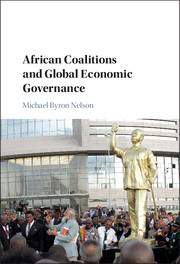Book contents
- Frontmatter
- Contents
- List of Figures
- List of Tables
- Acknowledgments
- List of Abbreviations
- 1 Introduction
- PART I THEORY AND BACKGROUND
- PART II CASES
- 5 Global Food Safety Governance and Africa
- 6 Global IP Governance and African Coalitions
- 7 Africa and the Governance of Agricultural Trade
- 8 Conclusion
- Bibliography
- Index
5 - Global Food Safety Governance and Africa
from PART II - CASES
Published online by Cambridge University Press: 05 September 2016
- Frontmatter
- Contents
- List of Figures
- List of Tables
- Acknowledgments
- List of Abbreviations
- 1 Introduction
- PART I THEORY AND BACKGROUND
- PART II CASES
- 5 Global Food Safety Governance and Africa
- 6 Global IP Governance and African Coalitions
- 7 Africa and the Governance of Agricultural Trade
- 8 Conclusion
- Bibliography
- Index
Summary
Former Zambian President Levy Mwanawasa described genetically modified food as a “poison”; a South African farmer's cooperative associated with former President Mbeki's wife seeks approval from the US Food and Drug Administration for the export of a “new” fruit, the peppadew; and a Ugandan agriculture minister complains that disagreements between the United States and the European Union on food safety issues “remain one of the major constraints to food security and maximizing the benefits of free trade.” We know that people and governments in Africa care about food safety in part because they tell us so. International food safety rules matter for African states. While food scarcity is a more important problem for many, food safety is not just a “first world” problem. As one World Health Organization (WHO) official pointed out to me, Africans and others living in the developing world typically suffer the greatest public health consequences from unsafe foods. International food safety rules affect African production choices, trade in food, consumption patterns, and public health. Economists pay increasing attention to the impact of food safety standards on developing countries, especially the implications of standards as nontariff barriers to their exports. As tariff barriers decline, the visibility of food safety measures as barriers to trade increases. My primary focus here will be on the trade-related aspects of food safety governance.
I make two key arguments here. One is that the relatively unique integration of the core institutions involved in food safety governance makes it difficult for states to form and use coalitions. The second is that adapting to change in an institutional system (IS) also may be difficult. In this case, it has taken African states – and many others – some time to adapt to the current system that was ushered in with creation of the World Trade Organization (WTO).
Effective negotiation of international food safety rules requires expertise in science, law, and business. Mobilizing such resources can be a challenge for most African states. Their lack of influence is not simply a matter of weak capacity or weak preferences (often their preferences are strong). The challenges are greater for food safety governance than for agricultural trade or intellectual property because of the unique set of relationships among several key international organizations.
- Type
- Chapter
- Information
- African Coalitions and Global Economic Governance , pp. 109 - 169Publisher: Cambridge University PressPrint publication year: 2016



